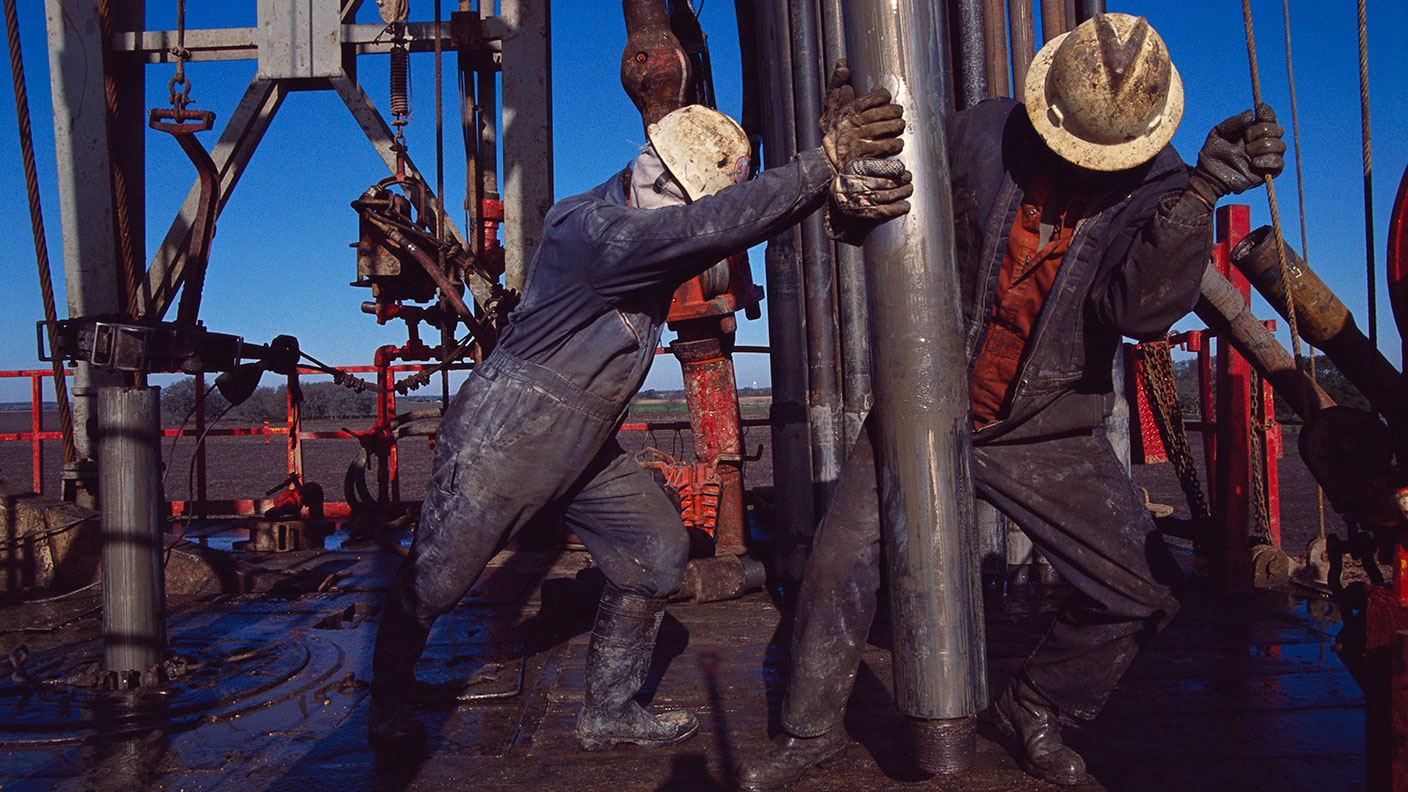Oil shares have never been this cheap – but will they just get even cheaper?
The oil sector is staggeringly cheap. But oil is still one of the most important commodities in the world. John Stepek looks at where energy stocks might go from here.


Get the latest financial news, insights and expert analysis from our award-winning MoneyWeek team, to help you understand what really matters when it comes to your finances.
You are now subscribed
Your newsletter sign-up was successful
Want to add more newsletters?
It’s only been about a week since I last wrote about oil. But I’m finding it fascinating at the moment. Like most value-orientated investors, I just can’t resist constantly returning to a sector that relentlessly gets cheaper and cheaper.
Of course, as many value investors have learned to their cost in the last decade or so, things that are cheap can just carry on that way until they’ve gone all the way to zero (or below, in some cases).
But when you’re talking about a group of companies selling what is still one of the most important commodities in the world – I just can’t help myself.
Try 6 free issues of MoneyWeek today
Get unparalleled financial insight, analysis and expert opinion you can profit from.

Sign up to Money Morning
Don't miss the latest investment and personal finances news, market analysis, plus money-saving tips with our free twice-daily newsletter
Don't miss the latest investment and personal finances news, market analysis, plus money-saving tips with our free twice-daily newsletter
The oil sector is staggeringly cheap
Louis-Vincent Gave at research group Gavekal has just put out a piece on oil prices. As ever with Gave, it’s extremely interesting. His core point – one we’ll return to in the future – is that oil, the US dollar, and US government debt have all been trading in a tight range since March. Those are all really important prices. If they start to trend properly in one direction or another, then we’ll have a very different investment environment on our hands.
But in this piece he focuses on oil. He looks at both the bearish and the bullish case, but I really just wanted to highlight some of the incredible statistics that are in his piece. He points out that energy stocks are now the smallest sector in the MSCI World index, with a weighting of just 2.48%. That compares to Apple, with a weighting of 4.46%. In other words, Apple by itself is almost twice as significant as the entire listed energy complex.
OK, Apple is the virtual, shiny, ultra-hygienic future into which we are being propelled, while oil is the real-world, gritty, dirty present day that we are apparently leaving behind. But we don’t all run on batteries yet, and even in lockdown some of us need to get from A to B and sometimes even to C. And the latter requires cars and occasionally planes.
So does that disparity in valuation make sense on the fundamentals? Or is it being driven more by an environment that puts little value on the present relative to the future, because of ultra-low interest rates? Is it all part of the “long duration” bubble? I’m guessing it’s the latter.
Meanwhile, for the first time ever, says Gave, “the broad energy industry is trading at below book value.” In other words, companies are trading for less than the value of the assets on their balance sheets.
That’s fascinating and it’s genuinely unprecedented. It’s also only happened this year. For roughly the decade after the financial crisis, the MSCI World energy index traded at around 1.5 to two times book value. Prior to that it was a lot higher – from 1996 to the financial crisis the low was about two and the high above 3.5.
And the fact that oil has proved to be such a poor investment in recent years means that “energy may well be the only major industry in the world today that is genuinely starved of capital.” Investors aren’t willing to pour yet more good money after bad simply to allow oil companies to keep spending too much to get a depreciating asset out of the ground.
As a result, oil production is falling. That doesn’t matter just now because demand has dropped hard. And with countries around the world locking down to varying and confusing degrees all over again, it’s not likely to bounce back sharpish. Yet what happens when it does?
Moreover, as Cris Sholto Heaton points out in the current issue of MoneyWeek, out today, the oil price doesn’t have to be high for oil producers to make money. If the majors are no longer squandering money in the hunt for new oil, and are instead just hunkering down and running down their existing resources – well that could be very profitable indeed. The oil stocks could be like the tobacco stocks were – unpopular, dirty, but absolute cash machines.
There’s probably no rush to dive in to the sector. But it’s something to stay aware of.
We’ve got a big birthday coming up
On the topic of MoneyWeek magazine, before we go today, I wanted to draw your attention to a big birthday we’ve got coming up. At the start of November, MoneyWeek will be 20 years old.
A great deal has changed in the last 20 years – and I’ll admit that capping the past two decades with a global pandemic was not high on the list of things we expected to happen – but we want to focus on what might happen in the next 20.
We’ll be looking at everything from longevity trends to the risk of inflation returning, to the role of cryptocurrencies, to the state of geopolitics in 2040.
And we’d like your help! We’re asking our readers and contributors a set of five specific yes/no questions on events that may or may not occur by 2040. This week we’ve been asking “will gold hit $10,000 an ounce by 2040?” and “will a human being have set foot on the moon as a tourist by 2040?”
We’ll be releasing the full list here over the next two weeks. Send your answers – plus your justifications – for all or any of the questions to 2040@moneyweek.com. We’ll print the best answers in the November 6th issue.
And if you don’t already subscribe – don’t miss it! Sign up now! You get your first six issues absolutely free.
Get the latest financial news, insights and expert analysis from our award-winning MoneyWeek team, to help you understand what really matters when it comes to your finances.

-
 Are money problems driving the mental health crisis? MoneyWeek Talks
Are money problems driving the mental health crisis? MoneyWeek TalksPodcast Clare Francis, savings and investments director at Barclays, speaks about money and mental health, why you should start investing, and how to build long-term financial resilience.
-
 Pensioners ‘running down larger pots’ to avoid inheritance tax as rule change looms
Pensioners ‘running down larger pots’ to avoid inheritance tax as rule change loomsChanges to inheritance tax (IHT) rules for unused pension pots from April 2027 could trigger an ‘exodus of large defined contribution pension pots’, as retirees spend their savings rather than leave their loved ones with an IHT bill.
-
 What's behind the big shift in Japanese government bonds?
What's behind the big shift in Japanese government bonds?Rising long-term Japanese government bond yields point to growing nervousness about the future – and not just inflation
-
 Halifax: House price slump continues as prices slide for the sixth consecutive month
Halifax: House price slump continues as prices slide for the sixth consecutive monthUK house prices fell again in September as buyers returned, but the slowdown was not as fast as anticipated, latest Halifax data shows. Where are house prices falling the most?
-
 Rents hit a record high - but is the opportunity for buy-to-let investors still strong?
Rents hit a record high - but is the opportunity for buy-to-let investors still strong?UK rent prices have hit a record high with the average hitting over £1,200 a month says Rightmove. Are there still opportunities in buy-to-let?
-
 Pension savers turn to gold investments
Pension savers turn to gold investmentsInvestors are racing to buy gold to protect their pensions from a stock market correction and high inflation, experts say
-
 Where to find the best returns from student accommodation
Where to find the best returns from student accommodationStudent accommodation can be a lucrative investment if you know where to look.
-
 The world’s best bargain stocks
The world’s best bargain stocksSearching for bargain stocks with Alec Cutler of the Orbis Global Balanced Fund, who tells Andrew Van Sickle which sectors are being overlooked.
-
 Revealed: the cheapest cities to own a home in Britain
Revealed: the cheapest cities to own a home in BritainNew research reveals the cheapest cities to own a home, taking account of mortgage payments, utility bills and council tax
-
 UK recession: How to protect your portfolio
UK recession: How to protect your portfolioAs the UK recession is confirmed, we look at ways to protect your wealth.